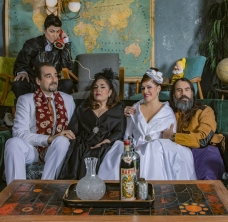Le nozze di Figaro, the first of Mozart's three operas to a libretto by Lorenzo da Ponte, returns to the Greek National Opera. Based on Beaumarchais's comedy La folle journ?e, ou le Mariage de Figaro, the work was first presented in Vienna in 1786, a few years before the French Revolution. The libretto reflects the era's unrest and the tension in the relations between different social classes: on the one hand the count and the countess and on the other hand their servants, Susanna and Figaro. Mozart's masterly music outlines each character by simple means. Apart from the usual arias for each role and the duets between them, the composer creates incredibly imaginative ensembles, like the famous septet in Act Two: starting with one, then two, three, four, five, six and in the end seven characters discuss with each other during a thrilling music part, which lasts for twenty minutes without, however, losing its clarity and power. But above all, it is a work whose characters are principally humane, with all their aspects, both positive and dark ones, equally brought out into the light.
The director of the production and artistic director of the GNO Alternative Stage, Alexandros Efklidis, notes: «Le nozze di Figaro, as well as the rest of the works resulting from the Mozart-Da Ponte cooperation, often suffer from their unquestionable classification as timeless masterpieces: their playful, comic and even farcical character, is outweighed before the dazzle caused by their musical genius as well as the density of meanings co-articulated through the ideal co-existence of music and speech. This new production of the work for the Greek National Opera focuses on Mozart's comic, yet paradoxical world of opera and attempts to bring out the subtleties of the composer's musico-dramatic genius. Within a movie set which reflects a universe of retro paradoxicality, Mozart's heroes morph into cogs in a strange world, put together by the opera's theatrical details; meanwhile, emphasis is given on the timeless struggle for social climbing and decency.»









 Greek National Opera
Greek National Opera

